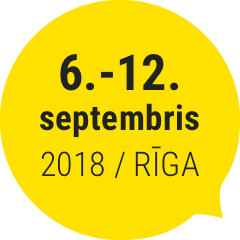
Blogs
Theater Review: Homo Novus theater festival urges to listen to nature
Vadim Dumesh, bne intellinews.com | 28 09 2018 | Recenzija
While modern theatre classic and international superstar Alvis Hermanis makes a bet on crowd pleasers in the latest season of his flagship New Riga Theatre, the eleventh 2018 edition of the Homo Novus international contemporary theatre festival and its artistic director Gundega Laivina continued to make bold choices and challenge the viewers with novel intellectual ideas in unconventional spaces.
“Listen to nature,” was the unmistakable message of this year’s festival with both the opening piece the ‘Three Opera. The City’, and the closing performance ‘What Nature Says’, using the stage to speak and sing for nature. The opera riches and noble heritage of the Renaissance is summoned to remind the man, that he perhaps in not the centre of the universe and we owe attention to our fellow earthlings.
Such reminder is as timely as ever. In case you haven’t heard the Earth has arguably entered the Anthropocene, a new geological age in which humanity has grown to become a geological force on a planetary scale. However, as the Anthropocene satire opera ‘Uknown Uknown’ by young British composer Oliver Leith warns against, the Homo Novus participants do not simply slide into “happy-happy-joy-joy-eco-sincerity” and annoying bio-organic self-righteousness when treating the subject.
As the leading thinkers on the Anthropocene have long established, our age of absolute human domination has been enabled by a deep, fundamental “modern” bifurcation between nature and culture, between the natural world out there and the society. Some works presented at the Homo Novus festival grapple with this core nature-culture divide, trying to give birth to hybrids between nature and human agents representing it, on the way challenging both the space of representation and the viewing experience of a stage act.
Indeed, such hybrid language is used by ‘Three Opera. The City’ and ‘What Nature Says’, while female body relationship with space is challenged in the performances presented in ‘Spaces of Becoming’ by a trio of young choreographers from Latvia, Iceland, and Finland. An alternative meditative viewing experience was proposed by Latvian director Krista Burane who tried the make the visitors of her participatory play ‘Nocturne’ to literally inhibit the life of abundant city wildlife on the outskirts of Riga on the bank of the Daugava river.
But while Homo Novus 2018 was grappling with complex human-nature relationship, the vision of the New Man proudly carried in its title was nowhere to be found. Negation and condemnation seems to be the only answer to the human in the few anthropocentric plays in the programme. Once the howling and growling, the whistling and murmuring, or other attempts to channel the nature in us and through us are abandoned, we are back to square one of the dilemma: that a man only exists within the culture, the world of coded language and information.
And on that side of the bifurcation, the humans are indeed presented as a bothersome spectacle, nothing but dysfunctional carriers of knowledge, vessels of codes and information gone wrong. In the Flemish artist’s Benny Claessens solo play ‘Hello Useless – for W and Friends’ such dysfunctionality becomes is a celebration of uselessness, bitter and vulnerable recycling of cultural clichés. In the work of the Estonian artist trio ‘Workshop’, the broken man is unable to learn or teach without succumbing to violence. In the ‘MDLSX’ of an Italian theatre company Motus, the very foundations of human identity are unravelled.
The programme of the festival seems to fall on either one or the other side of nature-culture divide. The viewer is asked to either listen to nature or lament human decay, but is never shown a bridge between the two acts. But after all, the role of the artist is to ask questions, not to answer them, and the 2018 edition of Homo Novus festival does just that.
Published on bne IntelliNews
